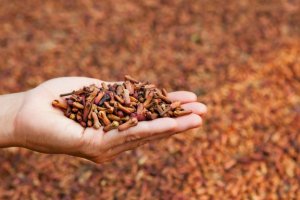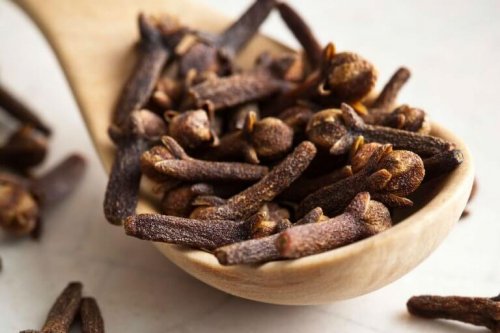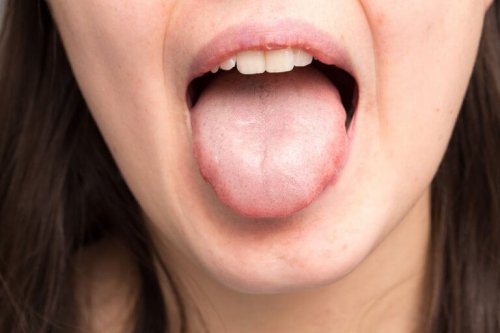5 Medicinal Uses of Cloves to Improve Health

Are you aware of some of the many amazing uses of cloves?
Cloves have been used as a medicinal plant since ancient times to combat certain diseases. They come from the Syzygium aromaticum treeand have properties that promote the health of the digestive system and improve metabolism.
While they’re widely used in cooking all over the world, they’ve also become very popular as a natural remedy.
However, many people are unaware of all the health benefits of cloves. For example, they’re a significant source of tannins, flavonoids, sterols, and other components that improve health. In this article, we’ll take a look at some of the many uses of cloves.
The Medicinal Uses of Cloves
Cloves have been used around the globe as a spice for many different foods like meat, pastries, drinks, etc. They’re also commonly used for their strong and pleasing aroma. While there are many positive aspects of cloves, this article will focus only on their medicinal properties.
First, it should be noted that cloves act as a very powerful stimulant. They can be used to increase the appetite, eliminate intestinal gas, and to combat certain oral infections.
Additionally, clove oil and extracts are also used in some toothpastes and dental medicines.
As you can already see, the medicinal properties and uses of cloves are numerous. Continue reading to learn more about how cloves can become a part of your medicine cabinet.
1. Cloves are a remedy for digestive problems.

One of the most important uses of cloves is to help the digestive system. Due to their carminative and anti-inflammatory properties, they’re perfect for relieving gas and indigestion. Moreover, extracts made from cloves can be used to treat ulcers.
Ingredients
- 5 cloves
- 1 cup of water
Preparation
- First, boil the cup of water.
- When the water reaches a boil, add the cloves.
- Turn the heat off and let the cloves steep in the water for 10 minutes.
- After 10 minutes have passed, strain it and then drink it.
- Drink this 2 times a day for 3 days straight for the best results.
2. The uses of cloves help with sore throats.
The antimicrobial properties of cloves help eliminate microorganisms that can irritate the throat.
While they should not be eaten on their own, they’re very effective when eaten with other healthy ingredients.
Ingredients
- 1 teaspoon of ground cloves (5 g)
- 1 tablespoon of pure radish (15 g)
- Honey (15 g)
- Lukewarm water (200 ml)
Preparation
- Combine all of the ingredients and put them in the cup of lukewarm water.
- Now, gargle the mixture for 2 or 3 minutes.
- Repeat every day until your throat begins to feel better.
3. They’re a great remedy for oral health.

Another medicinal use of cloves is for oral health. This is because they not only help decrease the growth of bacteria that cause gum illnesses and infections, but they also reduce plaque and help reduce problems like toothaches and bad breath.
Ingredients
- 2 sprigs of parsley
- 3 cloves
- 2 cups of water (400 ml)
Preparation
- First, boil the two cups of water.
- Once it reaches a boil, add the parsley and cloves.
- Reduce the heat and leave to cook for 2 minutes.
- Next, remove from the heat, cover the drink, and let sit for 10 or 15 minutes.
- Then, strain it.
- Lastly, drink this infusion three times a day for the best results.
We also recommend: Make a Medicinal Tea with Apples, Cinnamon, Anise, and Cloves
4. The uses of cloves are helpful as a remedy for the liver.
This spice contains an active substance called eugenol, which is especially beneficial for the health of the liver. Eugenol can contribute to the treatment of fatty liver and the effects caused by oxidative stress. It can also help the body fight against liver cirrhosis.
Ingredients
- 5 cloves
- 1 cup of water (200 ml)
- 1 tablespoon of honey (15 g)
Preparation
- Boil the water.
- Once the water reaches a boil, add the cloves.
- Then, cover the mixture and let sit for 10 minutes.
- Next, strain the mixture and add the honey.
- Drink this once a day for 2 straight weeks for the best results.
Discover: Chamomile and Other Remedies that Improve Digestion
5. They’re a great remedy for coughing.

This natural ingredient is also great for treating a cough or other respiratory problems. Its properties help fight viruses and bacteria that affect the lungs. In addition, it helps to strengthen the immune system.
Ingredients
- 3 cloves
- 1 cup of water (200 ml)
- 1/2 lemon juiced
- 1 tablespoon of honey (15 g)
Preparation
- First, bring the water to a boil.
- Once it has reached a boil, add the cloves, lemon juice and honey.
- Let steep for 10 minutes and then drink.
- Drink this infusion every night before sleeping or until the symptoms disappear.
Caution!
While there are several medicinal benefits to using cloves, there are some cases when people should not eat cloves.
For instance, anyone suffering from liver failure of Crohn’s disease should refrain from eating cloves. Women who are pregnant and lactating should also avoid cloves.
Of course, if you have any doubts or concerns, you should consult with your doctor or medical specialist.
All cited sources were thoroughly reviewed by our team to ensure their quality, reliability, currency, and validity. The bibliography of this article was considered reliable and of academic or scientific accuracy.
- E.O., A. (2008). Gastrointestinal effects of Syzigium aromaticum (L) Merr. & Perry (Myrtaceae) in animal models. Nigerian Quarterly Journal of Hospital Medicine.
- Nzeako, B. C., Al-Kharousi, Z. S. N., & Al-Mahrooqui, Z. (2006). Antimicrobial activities of clove and thyme extracts. Sultan Qaboos University Medical Journal.
- Rompelberg, C. J. M., Vogels, J. T. W. E., de Vogel, N., Bruijntjes-Rozier, G. C. D. M., Stenhuis, W. H., Bogaards, J. J. P., & Verhagen, H. (1996). Effect of short-term dietary administration of eugenol in humans. Human & Experimental Toxicology. https://doi.org/10.1177/096032719601500205
- Prashar, A., Locke, I. C., & Evans, C. S. (2006). Cytotoxicity of clove (Syzygium aromaticum) oil and its major components to human skin cells. Cell Proliferation. https://doi.org/10.1111/j.1365-2184.2006.00384.x
- Santin, J. R., Lemos, M., Klein-Júnior, L. C., Machado, I. D., Costa, P., De Oliveira, A. P., … De Andrade, S. F. (2011). Gastroprotective activity of essential oil of the Syzygium aromaticum and its major component eugenol in different animal models. Naunyn-Schmiedeberg’s Archives of Pharmacology. https://doi.org/10.1007/s00210-010-0582-x
- Nurdjannah, N., & Bermawie, N. (2012). Cloves. In Handbook of Herbs and Spices: Second Edition. https://doi.org/10.1533/9780857095671.197
This text is provided for informational purposes only and does not replace consultation with a professional. If in doubt, consult your specialist.








